Culture 1 Class 3
2022_2023学年新教材高中英语Unit1CulturalHerit学生用书新人教版必修第二册

Section ⅢDiscovering Useful Structures每/日/金/句:This building which has a long history can date back to the Ming Dynasty.这栋历史悠久的建筑可以追溯到明朝。
语言基础集释1(教材P6)We met a professional archaeologist at the entrance to the Great Pyramid.我们在金字塔入口处遇到了一位专业的考古学家。
◎entrance n.入口;进入(1)the entrance to... ……的入口the college entrance examination 高考(2)enter vi.&vt. 进入[佳句] At the entrance to the shopping mall, I bought a digital camera of high quality.在商场的入口处,我买了一台高质量的数码相机。
[练通]——单句语法填空①After he found the ________ to the building, he ________ the hall without making a sound.(enter)②As far as I'm concerned, the key ________ success is to work hard.[写美]——应用文佳句③ 如果你有空,今天晚上7点我将在音乐厅的入口处和你见面。
If you are free, I'll meet you ________________________________________ at 7:00 this evening.[温馨提示] “the+n.+to” 结构the answer to... ……的答案the key to... ……的关键the solution to... ……的方法2(教材P6)He explained to us the process of building such a difficult structure.他向我们解释了建造如此困难的结构的过程。
高中英语UNIT 1 CULTURAL HERITAGE
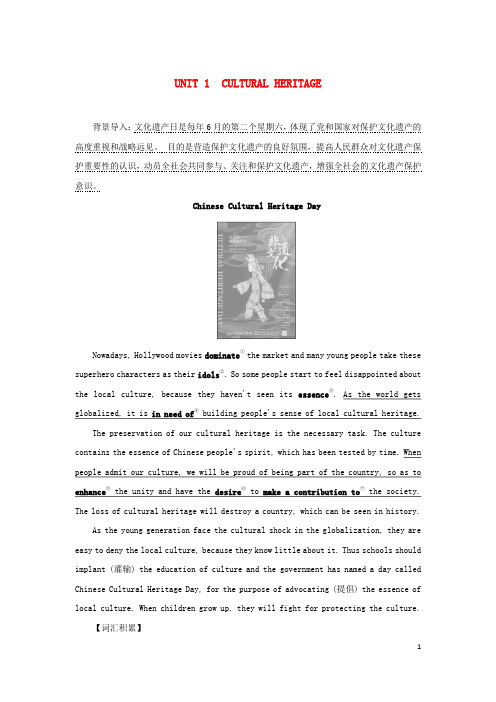
UNIT 1 CULTURAL HERITAGE背景导入:文化遗产日是每年6月的第二个星期六,体现了党和国家对保护文化遗产的高度重视和战略远见。
目的是营造保护文化遗产的良好氛围,提高人民群众对文化遗产保护重要性的认识,动员全社会共同参与、关注和保护文化遗产,增强全社会的文化遗产保护意识。
Chinese Cultural Heritage DayNowadays, Hollywood movies dominate①the market and many young people take these superhero characters as their idols②. So some people start to feel disappointed about the local culture, because they haven't seen its essence③. As the world gets globalized, it is in need of④ building people's sense of local cultural heritage.The preservation of our cultural heritage is the necessary task. The culture contains the essence of Chinese people's spirit, which has been tested by time. When people admit our culture, we will be proud of being part of the country, so as to enhance⑤ the unity and have the desire⑥ to make a contribution to⑦ the society. The loss of cultural heritage will destroy a country, which can be seen in history.As the young generation face the cultural shock in the globalization, they are easy to deny the local culture, because they know little about it. Thus schools should implant (灌输) the education of culture and the government has named a day called Chinese Cultural Heritage Day, for the purpose of advocating (提倡) the essence of local culture. When children grow up, they will fight for protecting the culture.【词汇积累】①dominate/'dɒmɪneɪt/vt.支配;控制②idol/'aɪdl/n.偶像③essence/'es(ə)ns/n.精华,精髓④in need of需要⑤enhance/ɪn'hɑːns/vt.提高;增强⑥desire/dɪ'zaɪə(r)/n.愿望,欲望,渴望v.渴望,想望⑦make a contribution to为……做出贡献【靓句背诵】1.As the world gets globalized, it is in need of building people's sense of local cultural heritage.随着世界的全球化,需要建立人们的地方文化遗产意识。
新编大学英语(浙大版)第一册第三单元课文翻译
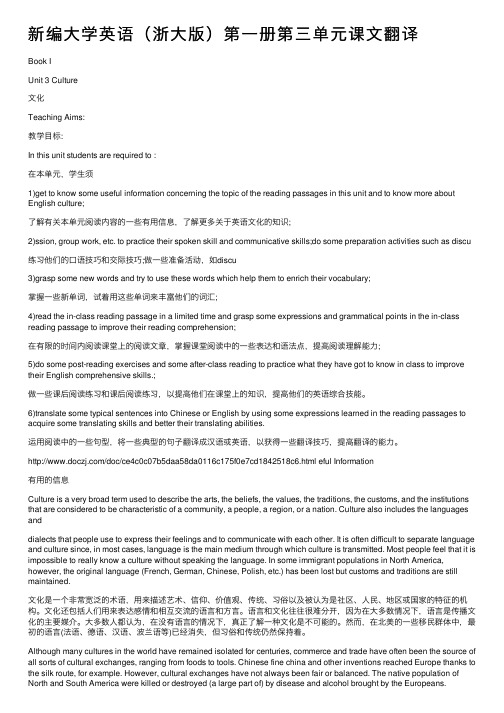
新编⼤学英语(浙⼤版)第⼀册第三单元课⽂翻译Book IUnit 3 Culture⽂化Teaching Aims:教学⽬标:In this unit students are required to :在本单元,学⽣须1)get to know some useful information concerning the topic of the reading passages in this unit and to know more about English culture;了解有关本单元阅读内容的⼀些有⽤信息,了解更多关于英语⽂化的知识;2)ssion, group work, etc. to practice their spoken skill and communicative skills;do some preparation activities such as discu练习他们的⼝语技巧和交际技巧;做⼀些准备活动,如discu3)grasp some new words and try to use these words which help them to enrich their vocabulary;掌握⼀些新单词,试着⽤这些单词来丰富他们的词汇;4)read the in-class reading passage in a limited time and grasp some expressions and grammatical points in the in-class reading passage to improve their reading comprehension;在有限的时间内阅读课堂上的阅读⽂章,掌握课堂阅读中的⼀些表达和语法点,提⾼阅读理解能⼒;5)do some post-reading exercises and some after-class reading to practice what they have got to know in class to improve their English comprehensive skills.;做⼀些课后阅读练习和课后阅读练习,以提⾼他们在课堂上的知识,提⾼他们的英语综合技能。
必修第二册 Unit 1 Cultural Heritage新人教

9
loss
→lose →lost
10
contribution
→contribute
1
n.丧失;损失 vt.丢失 adj.迷路的;失去的 n.捐款;贡献;捐赠 vi.& vt.捐献;捐助 vi.& vt.调查;研究 n.调查;研究
12
donate
1 mount
2 former 3 preserve 4 likely
n.山峰 vt.爬上;骑上 vi.爬;登上 adj.以前的;(两者中)前者的 vt.保存;保护;维持 n.保护区 adj.可能的 adv.可能地
5 department 6 within 7 issue
8 conduct
9 attempt 10 worthwhile
6 protest
7 committee 8 fund 9 document
10 republic 11 archaeologist 12 pyramid
n.抗议 vi.& vt.(公开)反对;抗议 n.委员会 n.基金;专款 n.文件;公文;(计算机)文档 vt.记录;记载(详情) n.共和国 n.考古学家 n.(古埃及的)金字塔;棱锥体
5 As they learn more about where they come from,they will hopefully be proud to tell others about their country and culture.(where引导宾 语从句) 当他们更多地了解他们从哪里来,他们将有希望自豪地向别人介绍 他们的国家和文化。
[词汇助力] 高频词汇
1 attendance 2 awful 3 bacterium(复bacteria) 4 baggage 5 banquet 6 bare
用英语讲好中国传统文化1-3

Chinese traditional culture1.Introduction to ChinaThe ancient Yellow River flows uninterrupted f ro m east to west for thousands of years. Silk was made into cloth, while clay was made in pottery and ceramics. Millions of stones were piled into the Great Wall. The country created many wonders, such as the Great Wall, Mogao Grottoes in Dunhuang, Terracotta Warriors and Chinese kung fu.Beijing is the capital of Zhongguo, or China, which opens to and embraces the world. The Beijing Olympic Games 2008 and the Shanghai World Expo 2010 were held here in Zhongguo. Peking Opera and Western Opera are performed on the same stage. Cultures of the whole world show brilliant vitality in this ancient country. This is Zhongguo.Hope you can understand her, appreciate her and love her. All the Chinese people, black-eyed and yellow-skinned welcome you with open arms.2.Ni hao!Ni ha o is the most commonly used greeting. Kong Qiu, or Confucius, told people 2,500 years ago that everyone must follow etiquette. So, China is called the 'home of etiquette'. Ni hau is the most typical greeting in China, wishing you well. A greeting that wishes you good health, a good job and a happy family. Let's say that together: 'Ni ha o!' Ni ha o! Ni ha o! Ni ha o! Ni ha o! Ni ha o!3.Confucius and Chinese philosophyBorn in 551 BC, Confucius, kong zi, has made the greatest contribution to Chinese culture of anyone in history. Although he was raised in a poor family, he visited famous scholars and learned a lot. He developed his thoughts into a system of philosophy known as Confucianism. Confucianism emphasized self-cultivation, harmonious relationships with each other and respect for the elderly. Friends should be honest to each other. Rulers should make an effort to provide a happy life for people.He was a great teacher as well and promoted education for ordinary people. He traveled around to promote his political thinking but failed. But he never gave up. Kong Zi is a great Chinese spiritual leader. Over the last 2,000 years, his philosophy has continued to influence China and the rest of the world. It is also regarded as the symbol of oriental culture.学习的世界,不存在永恒的靠山,你最强的靠山就是你的努力和独立。
Unit1CulturalHeritage大单元整体教学设计-高中英语人教版

高一英语大单元整体学习学程设计Unit 1 Cultural Heritage——Make a presentation to the class about the intangible cultural heritage 班级:小组:姓名:单元概述【单元内容】The theme of this unit is cultural heritage. It belongs to the topic of man and society. In this unit, we will listen to a news report about protecting cultural relics on Mount Tai and the history and culture of Red Square, read the problems and solutions in Egypt Aswan Dam project and write a news report about a person or a group who works to protect our cultural heritage. It is hoped that we can bine our knowledge with interest to think actively about how to participate in the protection of cultural heritage and put it into action.Beijing Opera Sphinx, Egypt Papercut Mount Tai, China【课标要求】核心素养课标要求语言能力语言知识语音能够辨别辅音连缀,在听力过程中准确辨音,提高听力理解和口语交际能力。
词汇能正确使用与“文化遗产”主题相关的词和词块来理解和表达。
culture(1)

Beijing is in the central place of the
nation's financial decisions and macrocontrol. It is the communication pivot between China and the international community and, the most important center for international exchanges.
Not only hoping for this skill, they also pray
to have a sweet love.
Culture
Culture
Literature Art Language Habit Belief Music Food Architecture Tradition Custom
Revolve: 旋转、循环 Deprecate: 反对,抨击,轻视
Do not do to others what you do not want done to yourself In teaching there should be no distinction of class.
己所不欲勿施于人
The National Flowers
Peony ['piːən]
vs
Plum blossom
The National Flowers
The peony, along with the plum blossom, are two traditional floral symbols of China. In 1903, the Qing Dynasty declared the peony as the national flower. Currently, the Republic of China designates the plum blossom as the national flower, while the People's Republic of China has no legally designated national flower.
仁爱版九年级上册 Unit1 topic3 Section A说课稿

Unit1 topic3 Section A说课稿教材分析本课是九年级第一单元第三话题的第一课时,主要活动是1a和3。
1a通过谈论纽约街头今昔的变化,学习含有since和for的现在完成时态。
1b通过听对话来获取特定的信息,提升学生的听力水平。
3既是重点也是难点。
让学生通过观察数轴来学习since和for的用法。
本节课通过纽约的今昔对比,引导学生关注社会的发展,关注文化的进步。
现在完成时是中招的一个考点也是中学生必须掌握的语法内容。
本节内容主要是学习现在完成时中“for”和“since”句式的使用,比较难也是易错点,需要认真学习。
随着社会的进步和发展,我们的家乡,祖国及世界各地都发生了巨大的变化,引导学生用英语描述身边交通,房屋等的变化,很自然就需要运用现在完成时,要求学生通过本节课的学习,可以熟练地用所学知识谈论身边及各地的变化。
培养学生的听说,口语表达能力,并通过对世界变化的描述,让学生感受到幸福生活来之不易,学会珍惜,培养学生的社会责任感和乐于助人精神Material analysis本课是九年级第一单元第三话题的第一课时,主活动为1a和3。
1a通过谈论纽约街头今昔的变化,学习含有since和for的现在完成时态。
1b通过听对话来获取特定的信息,提升学生的听力水平。
1c训练学生的口语表达能力。
2通过听短文来了解百老汇的变化。
3既是重点也是难点。
让学生通过观察数轴来学习since和for的用法,最后在4中进行口头运用。
本课通过纽约和百老汇的今昔对比,引导学生关注社会的发展,关注文化的进步。
二、教学重难点:重点:能区别since 和for 引导的时间状语,并在现在完成时中进行运用。
难点:1.能通过观察、听和说的方式感知并掌握since和for的用法。
2. 能用自己的语言表达家乡过去和现在的变化。
重点难点1.Key points:W ords and phrases:block artist visitor industry chemistry termget used to doing used to do asa matter of factSentences:Y ou have been in New Y ork for a long time.They used to be,but the city has improved a lot since Icame here a few years ago.Grammar:for+一段时过去的时间点since+时间段+ago二、学情分析:在本单元前两个话题的学习中,学生已初步掌握了现在完成时的结构和常见时间状语。
大学英语跨文化交流第一章ppt课件

精选ppt课件2021
20
4. Defining Culture from the Intercultural Perspective
“Culture is a system of shared beliefs, values, customs, behaviors and artifacts that are transmitted from generation to generation through learning.”
精选ppt课件2021
10
3. Culture Is Like the Water a Fish Swims In
精选ppt课件2021
11
“Out of water” = Out of Context
As a schooled fish… “Water” is my culture Other Waters or Air are
3. Summarize the process of the formation of cultural identity.
精选ppt课件2021
2
Chapter Outline
Culture
The Nature of Definitions Characteristics Cultural
Culture
How can we recognize it i精n选opptth课e件r2s02?1
8
Can you tell which of the following are above the water and which are below?
What and how people eat How to keep healthy How to raise children How to do business How to use time How to introduce people How to participate in ceremonies Rules for gestures Rules for facial expressions and eye contact Etiquette Work speed What is right or wrong, beautiful or ugly, clean or dirty, good or
跨文化chapter1
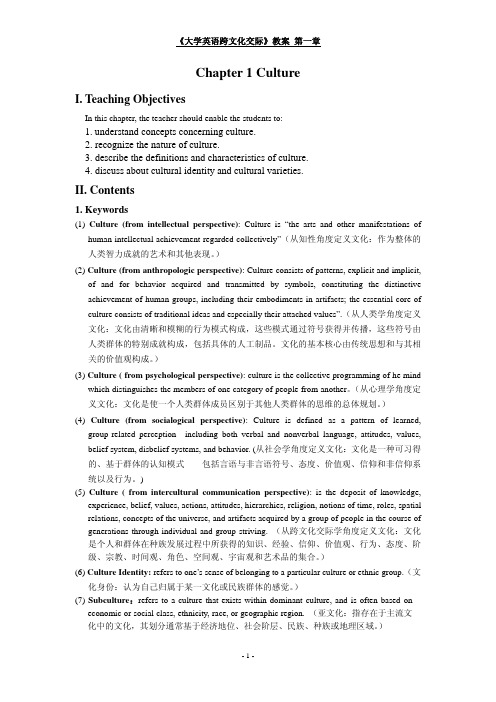
Chapter 1 CultureI. Teaching ObjectivesIn this chapter, the teacher should enable the students to:1. understand concepts concerning culture.2. recognize the nature of culture.3. describe the definitions and characteristics of culture.4. discuss about cultural identity and cultural varieties.II. Contents1. Keywords(1) Culture (from intellectual perspective): Culture is “the arts and other manifestations ofhuman intellectual achievement regarded collectively”(从知性角度定义文化:作为整体的人类智力成就的艺术和其他表现。
)(2) Culture (from anthropologic perspective): Culture consists of patterns, explicit and implicit,of and for behavior acquired and transmitted by symbols, constituting the distinctive achievement of human groups, including their embodiments in artifacts; the essential core of culture consists of traditional ideas and especially their attached values”.(从人类学角度定义文化:文化由清晰和模糊的行为模式构成,这些模式通过符号获得并传播,这些符号由人类群体的特别成就构成,包括具体的人工制品。
新编跨文化交际英语教程1~7单元翻译
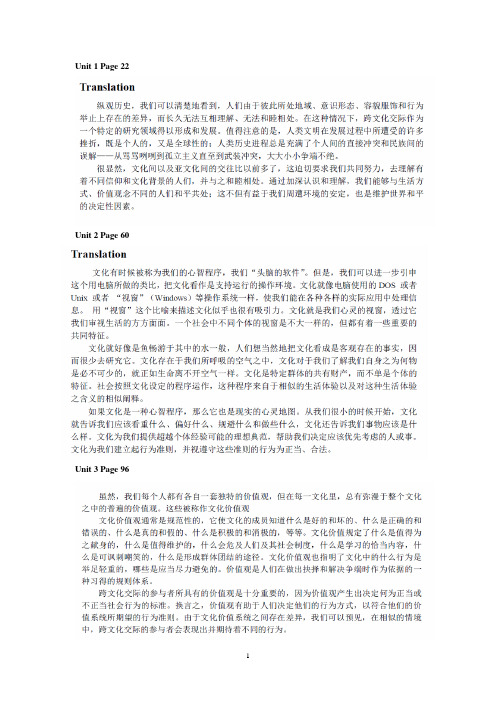
Unit 2 Page 60 Unit 3 Page 96Unit 5 Page 175 Unit 6 Page 215Case 2A common cultural misunderstanding in classes involves conflicts between what is said to be direct communication style and indirect communication style. In American culture, people tend to say what is on their minds and to mean what they say. Therefore, students in class are expected to ask questions when they need clarification. Mexican culture shares this preference of style with American culture in some situations, and that‘s why the students from Mexico readily adopted the techniques of asking questions in class. However, Korean people generally prefer indirect communication style, and therefore they tend to not say what is on their minds and to rely more on implications and inference, so as to be polite and respectful and avoid losing face through any improper verbal behavior. As is mentioned in the case, to many Koreans, numerous questions would show a disrespect for the teacher, and would also reflect that the student has not studied hard enough.Case 3The conflict here is a difference in cultural values and beliefs. In the beginning, Mary didn’t realize that her Dominican sister saw her as a member of the family, literally. In the Dominican view, family possessions are shared by everyone of the family. Luz was acting as most Dominican sisters would do in borrowing without asking every time. Once Mary understood that there was a different way of looking at this, she would become more accepting. However, she might still experience the same frustration when this happened again. She had to find ways to cope with her own emotional cultural reaction as well as her practical problem (the batteries running out).Case 6When a speaker says something to a hearer, there are at least three kinds ofmeanings involved: utterance meaning, speaker’s meaning and hearer’s meaning. In the dialogue, when Litz said ‘How long is she going to stay?’ she meant to say that if she knew how long her mother-in-law was going to stay in Finland, she would be able to make proper arrangements for her, such as taking her out to do some sightseeing. However, her mother-in-law overheard the conversation, and took Litz’s question to mean “Litz does not want me to stay for long”. From the Chinese point of view, it seems to be inappropriate for Litz to ask such a question just two days after her mother-in-law’s arrival. If she feels she has to ask the question, it would be better to ask some time later and she should not let her mother-in-law hear it.Case 7Keiko insists on giving valuable gifts to her college friends, because in countries like Japan, exchanging gifts is a strongly rooted social tradition. Should you receive a gift, and don’t have one to offer in return, you will probably create a crisis. If not as serious as a crisis, one who doesn’t offer a gift in return may be considered rude or impolite. Therefore, in Japan, gifts are a symbolic way to show appreciation, respect, gratitude and further relationship.Keiko obviously has taken those used items from Mary, Ed and Marion as gifts, for she probably doesn’t know that Americans frequently donate their used household items to church or to the community. Mary, Ed and Marion would never consider those used household items given to Keiko as gifts. No wonder they felt very uncomfortable when they received valuable gifts in return.Case 10In Japan, a company is often very much like a big family, in which the manger(s) will take good care of the employees and the employees are expected to devote themselves to the development of the company and, if it is necessary, to sacrifice their own individual interests for the interests of the company, from which, in the long run, the employees will benefit greatly. But for the French, a company is just a loosely- knit social organization wherein individuals are supposed to take care of themselves and their families. Moreover, the way the French make decisions in the family might also be different from the typical Japanese one, which may not often involve females and the power to decide usually lies with the dominating male. As there are such cultural differences between the Japanese and the French, Mr. Legrand’s decision made Mr. Tanaka feel dumbfounded.Case 12In this case, it seems that the Chinese expectations were not fulfilled. First, having two people sharing host responsibilities could be somewhat confusing to the hierarchically minded Chinese. Second, because age is often viewed as an indication of seniority, the Chinese might have considered the youth of their Canadian hosts as slight to their own status. Third, in China, it is traditional for the host to offer a welcome toast at the beginning of the meal, which is the reciprocated by the guests; by not doing so, the Canadian might be thought rude. The abrupt departure of the Chinese following the banquet was probably an indication that they were not pleased with the way they were treated. The Canadians’ lack of understanding of the Chinese culture and the Chinese ways of communication clearly cost them in their business dealings with the visiting delegation.Case 17When these two men separate, they may leave each other with very different impressions.Mr Richardson is very pleased to have made the acquaintance of Mr Chu and feels they have gotten off to a very good start. They have established their relationship on a first-name basis and Mr Chu’s smile seemed to indicate that he will be friendly and easy to do business with. Mr Richardson is particularly pleased that he had treated Mr Chu with respect for his Chinese background by calling him Hon-fai rather than using the western name, David, which seemed to him an unnecessary imposition of western culture.In contrast, Mr Chu feels quite uncomfortable with Mr Richardson. He feels it will be difficult to work with him, and that Mr Richardson might be rather insensitive to cultural differences. He is particularly bothered that, instead of calling him David or Mr Chu, Mr Richardson used his given name, Hon-fai, the name rarely used by anyone, in fact. It was this embarrassment which caused him to smile. He would feel more comfortable if they called each other Mr Chu and Mr Richardson. Nevertheless, when he was away at school in North America he learned that Americans feel uncomfortable calling people Mr for any extended period of time. His solution was to adopt a western name. He chose David for use in such situations.Case 19Talking about what’s wrong is not easy for people in any culture, but people in high-context countries like China put high priority on keeping harmony, preventing anyone from losing face, and nurturing the relationship. It seems that Ron Kelly had to learn a different way of sending message when he was in China. At home in Canada he would have gone directly to the point. But in China, going directly to the problem with someone may suggest that he or she has failed to live up to his or her responsibility and the honor of his or her organization is in question. In high-context cultures like China, such a message is serious and damaging. In low-context cultures, however, the tendency is just to “spit it out”, to get it into words and worry about the result later. Senders of unwelcome messages use objective facts, assuming, as with persuasion, that facts are neutral, instrumental, and impersonal. Indirectness is often the way members of high-context cultures choose to communicate about a problem. Case 21Sometimes our best intentions can lead to breakdowns (故障)in cross-cultural communication. For example, one of the very common manners of touching --- handshaking --- may result in conflict when performed with no consideration of cultural differences. Among middle-class North American men, it is customary to shake hands as a gesture of friendship. When wanting to communicate extra friendliness, a male in the United States may, while shaking hands, grasp with his left hand his friend’s right arm. However, to people of Middle Eastern countries, the left hand is profane (亵渎的) and touching someone with it is highly offensive. Therefore, in Vernon’s eyes, Kenneth was actually an extremely offensive message to him. Case 22In Puerto Rican culture, as in some other Latin American and Eastern cultures, it is not right for a child to keep an eye-contact with an adult who is accusing him or her, while in the United States, failing of meeting other person’s eye accusing him or her would be taken as a sign of guiltiness. As the principal knew little about this cultural difference in using eye-contact, he decided that the girl must be guilty. Generallyspeaking, avoiding eye-contact with the other(s) is often considered as an insult in some cultures, but may signify respect for authority and obedience in other cultures. Case 25For people from the American culture and western European cultures, one’s time should be scheduled into segments or compartments which are to be kept discrete from one another. They prefer to do one thing at a time. They will be annoyed when they have made an appointment with somebody, only to find a lot of other things going on at the same time. They don’t like to interrupt others and be interrupted by other while they are doing something. In contrast, people from many other cultures including the Chinese culture are more likely to operate with several people, ideas, or matters simultaneously. They are more easily distracted and subject to interruptions, which they would not usually mind very much. The miscommunication between Katherine and the director can be ascribed to their lack of knowledge about each other’s way of using time.In this case, to the Chinese director as well as many other Chinese people, it is natural to handle the other things which needed to be dealt with immediately. He may have thought that, in this way, he utilized the time best. But to Katherine and most Westerners, it’s quite different. They tend to do things strictly according to their schedule and appointments with others, which is their concept of using time best.高语境交流和低语境交流(由高到低排列)Japanese, Chinese, Korean, African American, Native American, Arab, Greek, Latin,Italian,English,Frech,Amercian,Scandinavian,German,German-Swiss。
新通用大学英语综合教程3_unit1课后答案及课件

Passage 3 Cultural Misinterpretations
Listen to the passage and answer the following questions.
1. Why did Mr. Wang send emails every day to the Canadian employee?
2. The man would like to be called by his ______.
A. first name
B. title and last name
C. title and first name
Part 3 Being Culturally Literate
Listen to three calls from a radio show, and check the subjects that were discussed.
New Words
amateur ★ armor n. n. 业余爱好者 盔甲
★ assassination
assume casual
n.
v. adj.
暗杀
假定, 设想 随便的,非正式的
commerce
◆ culturally ◆ distrust
n.
adv. n.
商业
文化地,文化上地 不信任
◆ emirate
T 1. Men used to wear jeans and ties to work in an office. 2. Casual Fridays started in the summer. 3. Employees in most companies liked the idea of causal Fridays.
lecture 2--nature of culture (1)

12
文化是历史上所创造的生活式样的系统,既包含显形 式样又包括隐形式样;它具有为整个群体共享的倾向, 或是在一定时期内为群体的特定部分所共享。或者
5
到底什么是文化(culture)?这个我们再也熟悉不过的 词语解释起来却相当麻烦,每个人看待它都有自己的 视角和层面,因而侧重点不一,导致它的“能指”非 常之多。据考证,文化有160多种定义,每个定义都 摸到了“文化”这头大象的某个部位。
中国大百科辞典将它解释为:“文化,指人类在社会 历史活动中所创造的物质财富和精神财富的总和 (culture)。狭义的“文化”则指社会的意识形态及 其与之相适应的制度和组织机构…… (Culture)。作为意 识形态的文化,是一定社会政治和经济的反映,同时, 又给一定社会的政治和经济以巨大影响和作用。”
3
People mean different things when they talk about culture
我没文化,不识字。 我文化水平不够高,欣赏不了这幅画。 Chinese culture and American culture; ancient
culture and modern culture; material culture and nonmaterial culture, everyday culture and sophisticated culture. 企业文化,饮食文化,酒文化,茶文化。
5 Some metaphors concerning culture
仁爱版九年级英语上册Unit1Topic3SectionC教案

Section CⅠ. Material analysis本课是九年级第一单元第三话题的第三课时,承接第二个话题,继续谈论社会问题和公共服务,主活动是1a和3。
1a通过分析流浪人口的产生原因和导致的结果,让学生正确认识流浪人口这种社会现象。
1b的任务主要是培养学生提炼文章标题的能力。
1c则是让学生学会寻找特定的信息。
1d旨在培养学生根据上下文猜测词意的能力。
2这个看图说话属于半控制性任务。
让学生模仿1a的句型来谈论新的问题。
3的写作任务是建立在完成2的基础之上的。
让学生先讨论再写作,有利于降低写作难度,拓展学生的思维。
本课通过了解流浪人口产生的原因和结果,引导学生关注社会现象,思考社会问题的成因。
文章还向学生传递了“以人为本”的人文关怀的理念。
Ⅱ.Teaching aims1.Knowledge aims:掌握本课的重点词汇和短语,巩固现在完成时的用法。
2. Skill aims:运用不同的阅读方法找出文章主题,段落主旨句和细节描述。
能通过语境猜测词义,扫清阅读障碍。
能谈论和表达与本文相关材料的话题。
3. Emotional aims: ( optional)引导学生关注社会问题和社会服务,为社会主义的发展作出努力。
4. Culture awareness: (optional)了解世界各国存在的社会问题,分析产生的原因和导致的结果,关注各国政府就这个问题采取的应对措施,从而拓展学生的国际视野。
Ⅲ. The key points and difficult points1. Key points:Words and phrases: basic, human, value, period, whatever, steal, support, shelter, homelessness, earn, drug, mental, on purpose, effect, phrase, according, context, laborer, cruel, basic needs, a short period of, one place to another, in a shelter, mental illness, onpurpose, think of …as…2. Difficult points:口头报告和书面写作时,能有意识地使用“cause and effect”来组织段落。
译林牛津高中英语选择性必修第一册 Unit3+Extended-reading+教案+-
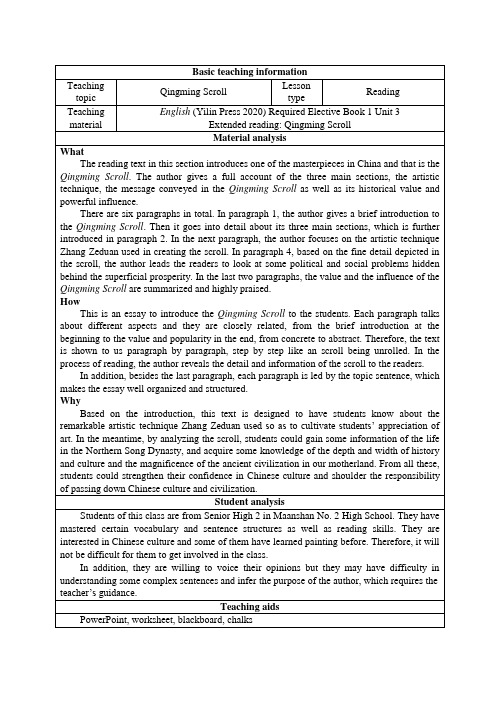
paragraph may talk about.Have SS read paragraph 2 and fill in the table.Have SS read paragraph 3.1.Find out the artistic technique Zhang used and fill in the blanks.2.In this paragraph, there are many adjectives like amazing, realistic, remarkable, impressive, precise, well-developed, ambitious, enormous.Ask SS: Why did the author use so many adjectives?Have SS pay attention to the word revealed in the Qingming Scroll.Blackboard designQingming Scrollpeaceful life Zhang Zeduan (张择端) comprehensive problems three sections valueartistic technique popularityattitudeSS’answersartistic techniqueQingming Scroll Worksheet1. Read paragraph 1 and answer the following questions. 3) How long is the scroll? 4) Which city does it show?2. Read the first sentence of each paragraph and guess what each paragraph talks about.Para. 1 Para. 2 Para. 3 Para. 4 Para. 5 Para. 64. Read paragraph 3. Find out the artistic technique Zhang used and fill in the blanks.5. Read paragraph 4 and complete the framework.examples to showthe problemsaspectsrevealed6.Read paragraph 5 and paragraph 6 and answer the questions.4)What does the value of the Qingming Scroll lie in?5)What happened to the copies of the scroll?6)Why is the scroll not often displayed to the public now?7.Group discussion: What attitude should we have towards cultural relics such as the Qingming Scroll?。
Chapter-3-Cultural-Diversity[1]
![Chapter-3-Cultural-Diversity[1]](https://img.taocdn.com/s3/m/b66be7426ad97f192279168884868762caaebbed.png)
Nature
Sense of Time
Past
Activity
Being (who you are
Social
Authoritarian
Relationship
Mixture of Good and Evil Man in Harmony with Nature Present
Growing (selfdevelopment) GroupOriented
• are very proud of their five-thousand-year civilization and their intelligent and
• diligent ancestors who created such a splendid culture.
• Although culture is subject to change, the deep structure of a culture is resistant to change.
• The comparison and contrast of different cultures help understand one’s own culture and other cultures, which will ultimately enhance the effect of intercultural communication.
Culture Diversity
2024/8/7
1
Warm-up: Read the following sayings aloud, and
discuss with your partner: what do they mean to you?
culture的名词形式
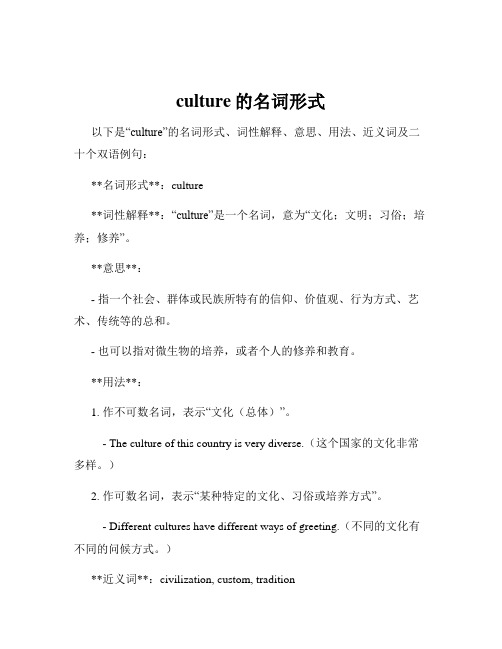
culture的名词形式以下是“culture”的名词形式、词性解释、意思、用法、近义词及二十个双语例句:**名词形式**:culture**词性解释**:“culture”是一个名词,意为“文化;文明;习俗;培养;修养”。
**意思**:- 指一个社会、群体或民族所特有的信仰、价值观、行为方式、艺术、传统等的总和。
- 也可以指对微生物的培养,或者个人的修养和教育。
**用法**:1. 作不可数名词,表示“文化(总体)”。
- The culture of this country is very diverse.(这个国家的文化非常多样。
)2. 作可数名词,表示“某种特定的文化、习俗或培养方式”。
- Different cultures have different ways of greeting.(不同的文化有不同的问候方式。
)**近义词**:civilization, custom, tradition**双语例句**:1. How can we preserve our traditional culture in the modern world?(在现代世界中,我们怎样才能保存我们的传统文化呢?)2. The company has a strong culture of innovation. (这家公司有强烈的创新文化。
)3. Don't you think that understanding different cultures enriches our lives? (难道你不认为了解不同的文化能丰富我们的生活吗?)4. His lack of culture showed in his behavior. (他的行为显示出他缺乏修养。
)5. We should respect the cultures of other countries. (我们应该尊重其他国家的文化。
Culture 1
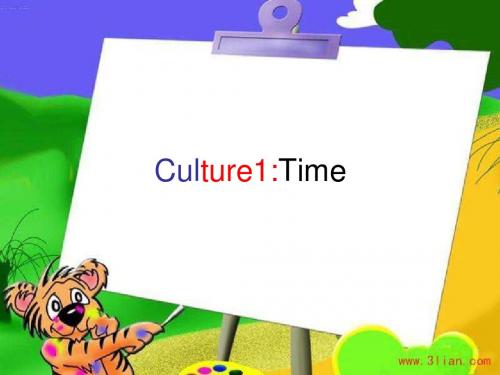
英国和中国的时差是8小时,中国比 英国早8小时,也就是英国是早上6:30, 中国是下午2:30.
说一说5min
China
中国 2:30p.m.
Australia 澳大利亚 4:30p.m.
澳大利亚(悉尼)与北京时间有2个小时 的时差,比北京早,中国下午2:30点,他 们是下午4:30点。
说一说5min
China 中国 2:30p.m.
India 印度 12:00p.m.
印度实行全国统一的新德里时间,新德里 于格林威治时区东5.5区,比北京东8区晚2.5 小时。
练一练5min
周周清5min(读熟)
Homework 家庭作业2min
1、制作关于时差的表格。
2、熟读文化单元。
Culture1:Time
Review 3 min
说一说2min
I make a new friend today . His name is Ken. Do you want to know him? Now let’s have a look.
看一看4min
Tina
NewYork
America
Tina
Ken (18456852)
Ken
9:00:01
Hello, Tina.
Tina 9:00:03
Ken
9:00:15
Monday morning? No, no, no. Tina. It’s Sunday evening in America now.
Hello, Ken. It’s Monday morning. Why don’t you go to school?你为什么不上学?
New York Sunday China Monday 9:00 a.m. 10:00 p.m.
- 1、下载文档前请自行甄别文档内容的完整性,平台不提供额外的编辑、内容补充、找答案等附加服务。
- 2、"仅部分预览"的文档,不可在线预览部分如存在完整性等问题,可反馈申请退款(可完整预览的文档不适用该条件!)。
- 3、如文档侵犯您的权益,请联系客服反馈,我们会尽快为您处理(人工客服工作时间:9:00-18:30)。
• Behaving with the highest integrity • competitive spirit, mostly through playful contests and competitions. • Rewarding individuals on the basis of merit, as opposed to wealth, or family or political connections. • Instituting education through play. • Designing a whole city as the school • Making public facilities free to the poor
In the field of theater, they were not only prolific theater goers, as witnessed by the historical record, and even more vividly by the fact that even the smallest city had a theater built in the center of town, but also invented many forms of theater still used today (such as, drama, comedy, tragedy, and the like).
• Inviting young people to adult events, where adults usually acted uprightly in their capacity as role models. • Exercising neighborhood supervision over the young. • The institutionalization through art of numerous role models, including lining streets with statues of heroes. • Involving numerous adults in a city-wide network of mentors who were not only unpaid, but considered it their honor to pay themselves for the pedagogical expenses ofeasy as pie: very easy. • "I thought you said this was a difficult problem. It isn't. In fact, it's as easy as pie."
Slang
• beat one's brains out: try very hard to understand or do something. • "Can you help me with this problem? I've been beating my brains out with it, but I just can't solve it."
• Herodotus is often named the "Father of History" ( history, in Greek, means "investigations"). Herodotus wrote the first Western historical chronicle, describing the Persian war. • Hippocrates is known as the "Father of Medicine". He was the first to do a treatise on human anatomy and bodily ailments. He also wrote an oath, known as the Hippocratic Oath, which lays out ethics for physicians and which is still in use today...
• Greece was home to many other "firsts" in the humanities, such as the first history and historian (Herodotus), the whole of the initial development of dramatic and comedic plays, the first practitioners of mathematics, many developments in political science including the creation of democracy and republics (albeit in oligarchic form), and virtually the whole of the fundamentals of classical western philosophy, as found in the works of Plato and Aristotle. Much of architecture has its roots in Greece, as well.
Some of the reasons The Greek culture was so influential.
• Democracy, where free speech and public criticism were openly practiced; and a corresponding hatred for tyrannies or one-manrule of all kinds. • Striving for excellence by the public at large. • A corresponding effort at moral excellence, including not only constantly inquiring which life is worth living, but also people practicing what they preached. • "fighting graft and corruption" at all levels • Trying to overcome personal weaknesses.
bull-headed: stubborn; inflexible. "Don't be so bull-headed. Why can't you admit that others' opinions are just as good as yours?"
Animal Picture of The Day
Culture 1 Class 3
Thanksgiving dinners take eighteen hours to prepare. They are consumed in twelve minutes. Half-times take twelve minutes. This is not coincidence.
Slang
• blow one's top: become extremely angry. • A: "Was your father upset when you came home at 3 AM?“
B: "He was more than upset. He blew his top!"
Slang
• Greek culture spread throughout the Mediterranean region, laid the foundation for the Roman Empire, and later, growing, Romans carried on much of the Greek culture upon Europe, adding to it the Roman system of law.
• Traditional Western Culture is said to have been created by three main historical factors: ancient Greece, the Roman Empire, and Christianity. As such, it is also known by the terms "GrecoRoman culture", " Judeo-Christian culture", or "Judeo-Hellenic-Christian culture".
• In the field of sports, the ancient Greeks loved competitions. Winners were those who excelled in competition, as determined by certain pre-established rules, rather than those who could manipulate results through their family's wealth, political connections, or, worse, corruption (such as, bribing officials). This is why Olympic athletes competed in the nude, partly to signify that on the play arena, they are all equal before the judges.
